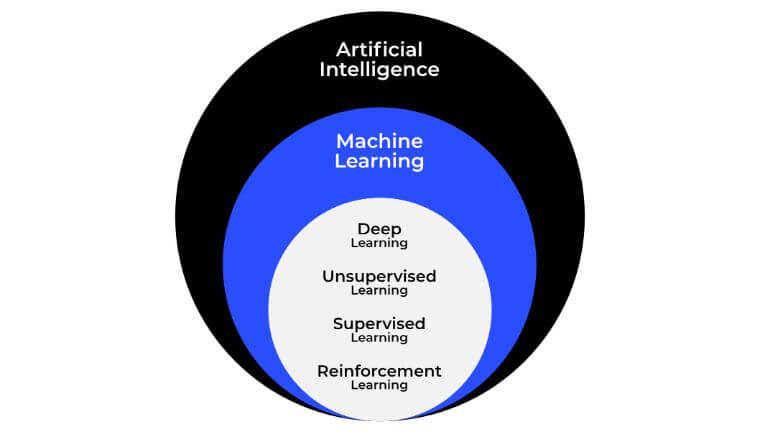Complex tasks such as self-driving cars, the translation tools that instantly translate from one language to another, or personalized purchase suggestions, etc., were previously a dream but are now possible; thanks to Machine Learning, a discipline that allows computers to learn by themselves and perform tasks autonomously without being programmed.

What is Machine Learning and What is It For?
Machine Learning is a discipline in Artificial Intelligence that, through algorithms, provides computers with the ability to identify patterns in massive data to make predictions. This learning allows computers to carry out specific tasks autonomously, without having to be programmed.
The term was first used in 1959. However, it has gained relevance in recent years due to increased computing power and the data boom. Machine learning techniques are, in fact, a fundamental part of Big Data.
Read more: SEO-related Questions that Every Beginner Should Know (Most Important)
Different Algorithms of ‘Machine Learning’
Machine Learning algorithms are divided into three categories, the first two being the most common:
Supervised practice: These algorithms have pre-practice based on a system of labels associated with the data that allows them to make decisions or predictions. An example is a spam detector that labels email as spam based on patterns learned from email history (sender, text/image ratio, keywords in the subject, etc.).
Unsupervised learning: These algorithms have no prior knowledge. They face data confusion to find patterns that allow them to perform somehow. In marketing, for example, they are used to gather large-scale data samples from social networks and to create highly fragmented advertising campaigns.
Reinforcement learning: The goal is for the algorithm to learn from its own experience. It is currently being used to enable facial recognition, make medical diagnoses, or classify DNA sequences. Machines learn from their previous experiences to make decisions according to the trial-and-error process.
Artificial Intelligence vs Machine Learning (AI vs Machine Learning)

What differentiates Artificial Intelligence from other computer programs is that it does not have to be programmed specifically for each scenario. We can teach them things (Machine Learning), but they can also learn by themselves (Deep Learning). Although there are multiple variants of each, they can be defined in a general way as follows:
-
- AI (Artificial Intelligence): a machine that is capable of mimicking human reasoning.
- ML (Machine Learning): a subset of Artificial Intelligence where people “train” machines to recognize patterns based on data and make their predictions.
- DL (Deep Learning): a subset of ML in which the machine is able to reason and draw its own conclusions, learning by itself.
Read more: Top 8 VPN Extensions for Google Chrome
Practical Applications of the ML

Machine learning is one of the pillars of digital transformation. Currently, it is already in use to find new solutions in various fields, which are worth highlighting:
♦ Recommendations: This allows you to make personalized purchase suggestions on online platforms or recommend songs. Its most basic form analyzes the history of purchases and reproductions of the user and compares it with what other users have done with similar trends or expenses.
♦ Smart vehicles: According to IBM’s Automotive, industry without borders report 2025, we will see smart cars on the road. Thanks to automatic learning, these vehicles can adjust the internal settings (temperature, music, backrest tilt, etc.) according to the driver’s preferences and move the steering wheel on their own to respond to the environment.
♦ Social Network: For example, Twitter uses ML algorithms to reduce spam published on this social network, while Facebook detects both false news and content that are not allowed on live streams. It will lock automatically.
♦ Medicine: Researchers are already using ML to detect breast cancer, which has been important since its early detection potential. Similarly, it is used with high efficiency to detect pneumonia and retinal diseases that cause blindness. Hence machine learning is going to prove a milestone in the medical field.
♦ Searches: search engines use ML to optimize their results based on their effectiveness, measuring it through user clicks.
♦ Cybersecurity: New antivirus and malware detection engines already use machine learning to enhance scanning, speed up detection, and improve the ability to recognize anomalies.
♦ Natural Language Processing (NLP): Through the understanding of human language, virtual assistants such as Amazon’s Alexa, Apple’s Siri, or Google assistant can instantly translate from one language to another, detect the user’s voice, and even analyze their emotions. On the other hand, the NLP can also be used for other complex tasks, such as translating the legal terminology of a contract into simpler language or assisting lawyers in handling large amounts of information related to a case.
I hope you have understood machine learning and how it is different from artificial intelligence. Stay tuned for the article to read about machine learning certification courses.
Read more: 15 Free AI Caption Generator Tools for Social Media Apps


